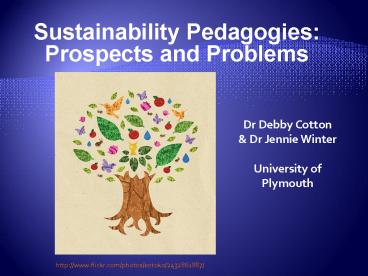Sustainability Pedagogies: Prospects and Problems - PowerPoint PPT Presentation
1 / 18
Title:
Sustainability Pedagogies: Prospects and Problems
Description:
Dr Debby Cotton & Dr Jennie Winter. University of Plymouth ... Dr Debby Cotton. Educational Development and Learning Technologies (EDaLT) ... – PowerPoint PPT presentation
Number of Views:55
Avg rating:3.0/5.0
Title: Sustainability Pedagogies: Prospects and Problems
1
Sustainability Pedagogies Prospects and
Problems
Dr Debby Cotton Dr Jennie Winter University
of Plymouth
http//www.flickr.com/photos/xotoko/2432861887/
2
HEFCE SD strategy and action plan Amongst other
things, the strategy seeks to encourage the
sector to develop curricula, pedagogy and
extra-curricular activities that enable students
to develop the values, skills and knowledge to
contribute to sustainable development (HEFCE
2005)
3
- Sustainability has the potential to become a
gateway to a different view of curriculum, of
pedagogy, of organisational change, of policy and
particularly of ethos (Sterling, 2004)
4
- Despite widespread policy support for ESD in HE
and an academic literature arguing for a radical
rethink of curriculum, pedagogy, and
institutional culture, progress towards achieving
the scale or nature of educational reforms
required has been limited.
http//www.flickr.com/photos/fotdmike/2674778713/
5
- Research shows
- a patchy picture with sustainable development
being marginal or non-existent in some
influential disciplines but increasingly higher
profile in others. - (Dawe et al., 2005)
6
Research at Plymouth
- Our research aimed to investigate why curriculum
change has been so problematic. - We explored lecturers views of sustainable
development (and its role in the HE curriculum).
Research team included Martyn Warren, Ian
Bailey, Susie Bissell and Olga Maiboroda at
different stages
7
Methods
- Online questionnaire using Perseus software sent
to all academic staff at the university (328
respondents, approx. 29) - Semi-structured interviews with a purposive
sample of lecturers (15), selected on the basis
of responses to the questionnaire to provide a
range of perspectives.
8
Barriers to pedagogic change
- Lack of necessary subject expertise 28
- Lack of relevance to my teaching 19
- Lack of time to make changes 13
- Institutional structures limit the
- changes I can make 13
9
Barriers to pedagogic change
- Even those individuals who professed a
commitment to including SD in their teaching
reported facing structural barriers which made
attainment of the ideal states of ESD (both in
terms of prominence and teaching styles)
unachievable. (Cotton et al., 2009)
10
What are Sustainability Pedagogies?
11
- Role plays and simulations
- Group discussions
- Stimulus activities
- Debates
- Critical incidents
- Case Studies
- Reflexive accounts
- Personal Development Planning (PDP)
- Critical reading and writing
- Problem based learning
- http//www.flickr.com/photos/foundphotoslj/4667134
78/
12
Why adopt different teaching methods?
- Often there are no hard facts, people are
required to make value judgements about courses
of action. Students need to be able to debate
this area. (ID103) - To achieve deep commitment, deep experience has
to take place, therefore role play and case
studies are used. (ID148) - SD means human participation, so participatory
processes and methods are an integral part of
teaching and learning. (ID118)
13
Role plays and simulations
- Through role playing is the way forward So I
will often say who thinks this is bad? and
invariably most of the group with think this and
then Ill flip their role instead of leaving
them with their preconceived idea. And at the end
of that discussion see which one they think is
going to get the publics vote. (Lecturer in
Marine Science)
14
Group Discussions
- Because you are talking mainly about concepts,
attitudes and value systems It would require
quite a lot of discussion and debate and
reflection. (Lecturer in Arts). - I think (discussions are) quite good ... because
if they're saying something you don't agree with
you'll kind of take it in and then try and think
of things to argue back, so it's quite a good
stimulus. (Student)
15
Modelling good practice
- I think at a personal level there is a huge
amount we can do and Ive always felt that you
set an example, its not just what you say, its
what you are. And if you stand up in front of a
group of students and say you should be going by
public transport and every evening you go out to
your car and drive home. Students are very
perceptive, and they understand this. - (Lecturer in Health)
16
Conclusions
- Interactive or student-centred pedagogies were
identified as being more appropriate for teaching
about sustainability - Tension identified between pedagogies recommended
for ESD and those commonly encountered in HE - Unclear whether advocated teaching strategies are
actual or aspirational. With large class sizes
opportunities for putting such strategies into
practice may be limited
17
For further information, see
- Cotton, D.R.E, Warren, M.F., Maiboroda, O.
Bailey, I. (2007) Sustainable Development, Higher
Education and Pedagogy A study of lecturers'
beliefs and attitudes. Environmental Education
Research 13 (5) 579-597. - Cotton, D., Bailey, I., Warren, M. Bissell, S.
(in press) Revolutions and second-best solutions
Education for Sustainable Development in Higher
Education. Studies in Higher Education. - Cotton, D.R.E Winter, J. (forthcoming 2009)
'It's not just bits of paper and light bulbs' A
review of sustainability pedagogies and their
potential for use in Higher Education. In Green
Infusions (Editors Jones, Selby Sterling)
18
Or contact
- Dr Debby Cotton
- Educational Development and Learning
Technologies (EDaLT), - University of Plymouth
- dcotton_at_plymouth.ac.uk































